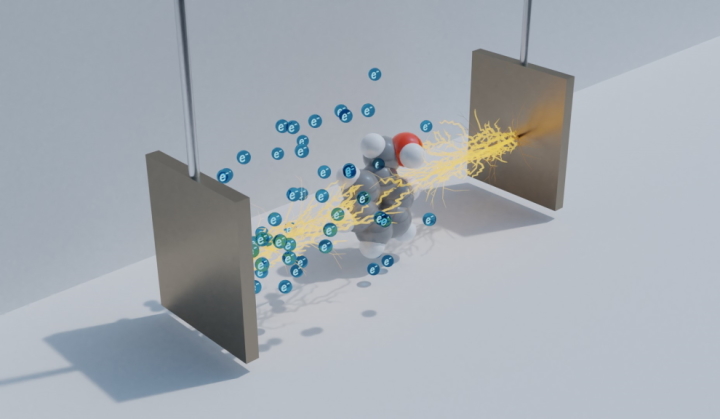Electrochemistry
During the past few years we have witnessed a remarkable renaissance of electrochemical methods for organic synthesis. In electroorganic synthesis, redox chemistry is carried out by interaction of the starting materials with the electrodes of the electrochemical cell. As electrons are essentially the reagent utilized for the redox process, the use of large amounts of often hazardous oxidizing or reducing reagents can be avoided. Reactive intermediates can be generated under relatively mild conditions (often room temperature) without producing any additional waste. Electrochemical reactions are therefore considered safe and provide some of the greenest and cost efficient synthetic strategies. Despite being known since the beginning of the 19th century, organic electrochemistry has been largely underutilized in synthetic laboratories. This is probably due to the lack of both dedicated equipment and insufficient familiarity of organic chemists with electrochemical methods. In spite of the large number of organic reactions available today, the field of electroorganic synthesis seems to have just started to unveil its potential. Some of the main challenges of electrochemical organic synthesis are related to the mass-transfer limitations of many of these transformations and the fact that the efficiency of the process depends on the surface contact between the electrodes and the reaction mixture. The use of flow electrochemical cells has been shown as a solution to overcome these problems. Flow setups provide an electrode-area to reaction volume ratio two orders of magnitude higher than for batch setups, resulting in very efficient electrolysis.

Key Publications
REVIEW: Synthesis of Active Pharmaceutical Ingredients using Electrochemical Methods: Keys to Improve Sustainability
D. Cantillo, Chem. Commun. 2022, 58, 619-628. DOI: 10.1039/D1CC06296D
Sustainable and Scalable Synthesis of Noroxymorphone via a Key Electrochemical N-Demethylation Step
F. Sommer, R. Gerber Aeschbacher, U. Thurnheer, C. O. Kappe, D. Cantillo, ACS Sustain. Chem. Eng. 2022, 10, 8988–8996. DOI: 10.1021/acssuschemeng.1c01668
Electrochemical Oxidation of Alcohols Using Nickel Oxide Hydroxide as Heterogeneous Electrocatalyst in Batch and Continuous Flow
W. Jud, C. A. Salazar, J. Imbrogno, J. Verghese, S. M. Guinness, J.-N. Desrosiers, C. O. Kappe, D. Cantillo, Org. Process Res. Dev. 2022, 26, 1486-1495. DOI: 10.1021/acs.oprd.2c00064
Chemoselective Electrochemical Oxidation of Secondary Alcohols using a Recyclable Chloride-Based Mediator
F. Sommer, C. O. Kappe, D. Cantillo, Synlett 2021, 33, 166-170. DOI: 10.1055/a-1511-8869
Chemoselective Electrochemical Oxidation of Secondary Alcohols using a Recyclable Chloride-Based Mediator
W. Jud, F. Sommer, C. O. Kappe, D. Cantillo, J. Org. Chem. 2021, 86, 16026-16034. DOI: 10.1021/acs.joc.1c01224
Sustainable Electrochemical Decarboxylative Acetoxylation of Aminoacids in Batch and Continuous Flow
M. Köckinger, P. Hanselmann, D. M. Roberge, P. Geotti-Bianchini, C. O. Kappe, D. Cantillo, Green Chem. 2021, 23, 2382–2390. DOI: 10.1039/D1GC00201E
One-Pot Multistep Electrochemical Strategy for the Modular Synthesis of Epoxides, Glycols and Aldehydes from Alkenes
W. Jud, C. O. Kappe, D. Cantillo, Electrochem. Sci. Adv. 2021, 1, e2100002. DOI: 10.1002/elsa.202100002
Electrochemically Enabled One‐Pot Multistep Synthesis of C19 Androgen Steroids
F. Sommer, C. O. Kappe, D. Cantillo, Chem. Eur. J. 2021, 27, 6044-6049. DOI: 10.1002/chem.202100446
Development and Assembly of a Flow Cell for Single-Pass Continuous Electroorganic Synthesis Using Laser-Cut Components
W. Jud, C. O. Kappe, D. Cantillo, Chem. Methods 2021, 1, 36-42. DOI: 10.1002/cmtd.202000042
Electrochemical N‑Demethylation of 14-Hydroxy Morphinans: Sustainable Access to Opioid Antagonists
G. Glotz, D. Cantillo, C. O. Kappe, Org. Lett. 2020, 22, 6891-6896. DOI: 10.1021/acs.orglett.0c02424
A Continuous Flow Cell for High Temperature/High Pressure Electroorganic Synthesis
W. Jud, C. O. Kappe, D. Cantillo ChemElectroChem 2020, 7, 2777-2783. DOI: 10.1002/celc.202000696
Translating Batch Electrochemistry to Single-Pass Continuous Flow Conditions: An Organic Chemist’s Guide
S. Maljuric, W. Jud, C. O. Kappe, D. Cantillo, J. Flow. Chem. 2020, 10, 181-190. DOI: 10.1007/s41981-019-00050-z
Cathodic C-H Trifluoromethylation of Arenes and Heteroarenes Enabled by an In Situ Generated Triflyltriethylammonium Complex
W. Jud, S. Maljuric, C. O. Kappe, D. Cantillo, Org. Lett. 2019, 21, 7970-7975. DOI: 10.1021/acs.orglett.9b02948
On the Reactivity of Anodically Generated Trifluoromethyl Radicals Toward Aryl Alkynes in Organic/Aqueous Media
W. Jud, C. O. Kappe, D. Cantillo, Org. Biomol. Chem. 2019, 17, 1384-1388. DOI: 10.1039/C9OB00456D
Catalyst Free Oxytrifluoromethylation of Alkenes via Paired Electrolysis in Organic-Aqueous Media
W. Jud, C. O. Kappe, D. Cantillo, Chem. Eur. J. 2018, 24, 17234-17238. DOI: 10.1002/chem.201804708
